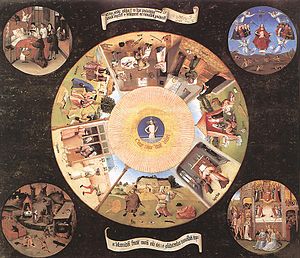Friday, June 17, 2011
We are a social creature
Discuss the biology of our species, the infant's depce as compared to other creatures. Despite our ostensible isolation, our self-made cocoons of air conditioning and flat-screen TVs, we still congregate for celebrations, we congregate to worship in a place that we consecrated to our chosen Higher Power, etc. Therefore, much as we behave as if the concept of sin may be outdated, the purpose of the list is to serve as a code of conduct which is never outdated. Relate to current day.
Sunday, June 12, 2011
The Seven and Seven
 |
There is a combination of Cardinal and Theological virtues derived initially from Plato's scheme, Protagoras and adapted by St. Ambrose, Augustine of Hippo and Thomas Aquinas. The term "cardinal" comes from the Latin "cardo" or hinge; the cardinal virtues are so called because they are hinges upon which the door of moral life swings. The theological virtues are so named because the object of these virtues is the divine being (theos).
The theological Seven Deadly Sins are: Lust, Gluttony, Greed, Sloth, Wrath, Envy and Pride.
Opposing the Seven Deadly Sins are the Seven Heavenly Virtues: Chastity, Temperance, Charity, Diligence, Patience, Kindness, Humility.
The keystone of the Virtues is restraint.
Let's look at the theological Virtues and their counterpart, the Deadly Sins:
Chastity-Lust: Chastity suggests restraint in matters of the flesh. Embracing of moral wholesomeness and achieving purity of thought and deed. It might be said that lust is base, and does not
glorify God's intent that joining of man and woman be for the purpose of procreation.
Temperance-Gluttony: Constant mindfulness of others and one's surroundings; practicing self-control, abstention, and moderation. In the act of gluttony, we give up control and mindfulness in favor of self-indulgence and pleasure-seeking. Remember that at the time this was written, food was not plentiful as it is now. It might be argued that gluttony is all the more abhorrent today, when food is so easily available.
Charity-Greed: Selflessness. Willingness to give and help. A selflessness of thought or actions. This harkens back to the days when the harvesters would leave some crop in the fields for the poor to glean. Clearly, its opposite, greed, is a lack of giving, an avarice that compels one to hoard, and cast a disparaging eye at the beggar.
Diligence-Sloth: An industrious attitude in one's actions and work. Decisive work ethic. Budgeting one's time; eschew laziness. Throwing oneself into a project with enthusiasm. Sloth is laziness, and
unwillingness to engage, or engaging grudgingly, dragging one's heels.
Patience-Wrath: Forbearance and patience with yourself and your fellowman. Resolving conflicts peacefully, as opposed to resorting to conflict or force to gain your objective. The ability to forgive; to show mercy. In modern parlence, don't hold a grudge. Be generous in understanding the other person's point of view. Do not allow your way of doing things to dominate a situation. Wrath speaks of deep anger, a sense of violence and harm toward another.
Kindness-Envy: Accept another's good fortune happily, and do not compare yourself. Realize that you have had your own good fortune in many situations. Envy simply is not relevant. Discard it. Do not nurture it, because it is not a truth. It denies all the blessings that you do have. Kindness also invokes elements of temperance.
Humility-Pride: Modest behavior, giving credit where credit is due; not unfairly glorifying one's own self. Do not boast, do not set yourself apart and above your fellowman. Do not assume that yours is the correct opinion. Make space for the other person.
Subscribe to:
Posts (Atom)